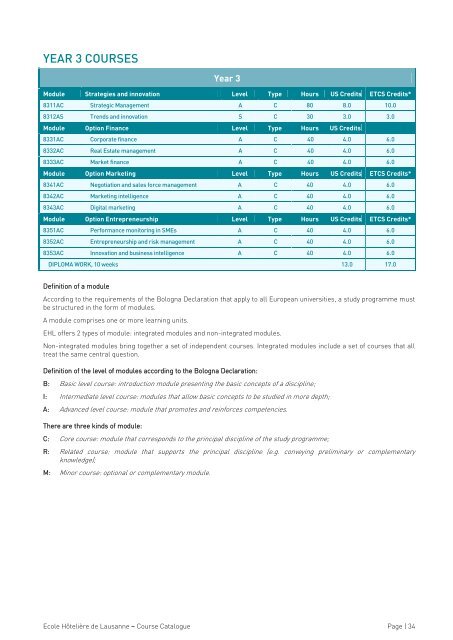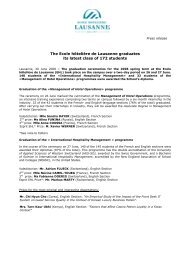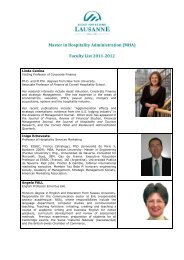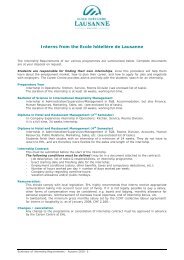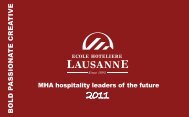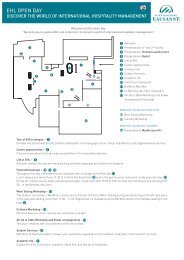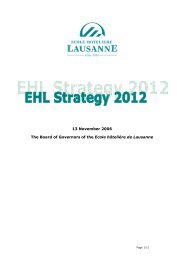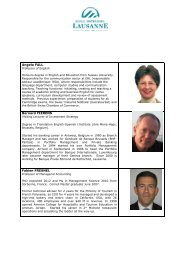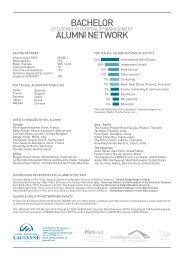EHL Course Catalogue 2011-2012 - Ecole Hôtelière de Lausanne
EHL Course Catalogue 2011-2012 - Ecole Hôtelière de Lausanne
EHL Course Catalogue 2011-2012 - Ecole Hôtelière de Lausanne
You also want an ePaper? Increase the reach of your titles
YUMPU automatically turns print PDFs into web optimized ePapers that Google loves.
YEAR 3 COURSES<br />
Year 3<br />
Module Strategies and innovation Level Type Hours US Credits ETCS Credits*<br />
8311AC Strategic Management A B C 80 8.0 10.0<br />
8312AS Trends and innovation S B C 30 3.0 3.0<br />
Module Option Finance Level Level Type Hours US Credits<br />
8331AC Corporate finance A C 40 4.0 6.0<br />
8332AC Real Estate management A B C 40 4.0 6.0<br />
8333AC Market finance A B C 40 4.0 6.0<br />
Module Option Marketing Level Type Hours US Credits ETCS Credits*<br />
8341AC Negotiation and sales force management A B C 40 4.0 6.0<br />
8342AC Marketing intelligence A C 40 4.0 6.0<br />
8343AC Digital marketing A C 40 4.0 6.0<br />
Module Option Entrepreneurship Level Type Hours US Credits ETCS Credits*<br />
8351AC Performance monitoring in SMEs A C 40 4.0 6.0<br />
8352AC Entrepreneurship and risk management A C 40 4.0 6.0<br />
8353AC Innovation and business intelligence A C 40 4.0 6.0<br />
DIPLOMA WORK, 10 weeks 13.0 17.0<br />
Definition of a module<br />
According to the requirements of the Bologna Declaration that apply to all European universities, a study programme must<br />
be structured in the form of modules.<br />
A module comprises one or more learning units.<br />
<strong>EHL</strong> offers 2 types of module: integrated modules and non-integrated modules.<br />
Non-integrated modules bring together a set of in<strong>de</strong>pen<strong>de</strong>nt courses. Integrated modules inclu<strong>de</strong> a set of courses that all<br />
treat the same central question.<br />
Definition of the level of modules according to the Bologna Declaration:<br />
B: Basic level course: introduction module presenting the basic concepts of a discipline;<br />
I: Intermediate level course: modules that allow basic concepts to be studied in more <strong>de</strong>pth;<br />
A: Advanced level course: module that promotes and reinforces competencies.<br />
There are three kinds of module:<br />
C: Core course: module that corresponds to the principal discipline of the study programme;<br />
R: Related course: module that supports the principal discipline (e.g. conveying preliminary or complementary<br />
knowledge);<br />
M: Minor course: optional or complementary module.<br />
<strong>Ecole</strong> <strong>Hôtelière</strong> <strong>de</strong> <strong>Lausanne</strong> – <strong>Course</strong> <strong>Catalogue</strong> Page | 34


